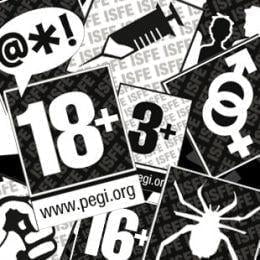New Pan-European Age Rating System For Video Games
 April 24, 2003 – The European Interactive Games industry today announced the launch of the first ever pan-European age rating system for computer and video games, designed to provide reassurance to parents and consumers.
April 24, 2003 – The European Interactive Games industry today announced the launch of the first ever pan-European age rating system for computer and video games, designed to provide reassurance to parents and consumers.
The new age rating system, known as PEGI (Pan European Game Information) will gradually supersede existing national systems successfully operated in a number of member states thus far. Just like those systems, it is designed to prevent the exposure of children to game content that is considered unsuitable for their age group.
The rating system, introduced by the Interactive Software Federation of Europe (Video Games Europe), to which all major format holders, publishers and developers belong, has two parts; an age rating and an indication of game content. Each game will feature an age rating on the front cover, indicating that the game is only suitable for those aged at or above the age listed. The age brackets are: 3 and over; 7 and over; 12 and over; 16 and over, and 18 and over. Minor local variations apply in Portugal and Finland, and Germany will retain its own rating system, as this is mandated by German law.
In addition to the age rating, the game box may also feature one or more descriptors, indicating the type of content. The descriptor will normally appear on the back of the game box, and the degree of content will always be appropriate to the age rating.
John Brunning, the new Chairman of Video Games Europe, welcomed the introduction of the new rating system, “The main objective of the new PEGI age rating system reflects the industry’s continuing concern to provide simple and clear guidance to parents and adult purchasers of games, so that children can be protected from exposure to content that is unsuitable for them. Building on earlier, successful voluntary systems operated at national level, the PEGI system harmonises this guidance across Europe, empowering parents and gatekeepers, through the age ratings and descriptors, to ensure that children are protected from viewing material that is unsuitable for their age.
Paul O’Donovan, Principal Analyst, Consumer Electronics at Gartner Dataquest, welcomed the new age rating system, "The video games market is no longer dominated by titles aimed exclusively at children. As the industry moves in to the mass market and appeals to a wider audience, any initiative that adds clarity to the effective national age rating schemes already in place is to be welcomed. Such self-regulation can only benefit the consumers of an industry that Gartner Dataquest estimates will be worth Euro 18.3 billion world-wide in 2007.
The new PEGI system, which combines self assessment by publishers with scrutiny by an independent body, is administered on behalf of Video Games Europe by the Netherlands Institute for the Classification of Audiovisual Media (NICAM). NICAM has already processed dozens of PEGI applications in the first Quarter of 2003, and the first products bearing the new PEGI set of logos and descriptors will reach European retail outlets towards the end of April. In the United Kingdom, the Video Standards Council (VSC) acts as the agent of NICAM in the administration of PEGI.
Commenting on the European level co-operation that had made the introduction of PEGI possible, Patrice Chazerand, Secretary General of Video Games Europe said, “ PEGI is an example of the true, effective European co-operation that EU institutions have been advocating for years with a view to make the Union feel like a single market to consumers and industrialists alike. Harmonized recommendations throughout the EU, endorsed by an independent body with a EU-wide reputation indeed make for more informed purchases by better oriented customers. PEGI happens to fit another key objective of the EU institutions, that of enhancing the role of self-regulation as an appropriate way to address the need for better adjusted, more practical, hence more enforceable regulations”.

